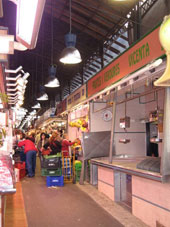
So you've got these friends, and when you get together, you spend a lot of time talking about food. Only one has any professional cooking experience, but over long meals, you work out an elaborate collective fantasy about opening some kind of culinary business. What should it be? A restaurant? Too time consuming (you've all got jobs, after all). A shop for prepared foods? Rent's too expensive. How about a stand in the market? And while we're at it, why not make it a stand in the most famous market in the world? I know from personal experience how Barcelona's Boqueria can inspire dreams. A simple stroll through its aisles leaves me plotting elaborate menus—some delicious sequence of rossinyols (Catalan wild mushrooms), baby squid, bunches of basil, and fresh duck eggs—that might be more than I could handle in my tiny kitchen. But when I first heard of Mariano, Juan, Oriol, and Pedro's plan to open their own stall in the Boqueria, I thought: "Wow, how much wine do we drink at those meals?". I wasn't about to get involved in their daydreams, but I didn't see the harm in monitoring their progress from a safe distance.
So about 18 months ago, I joined the foursome—two Spaniards and two Argentine transplants—in Barcelona as they prepared to open a stand in the Boqueria to sell fresh pasta. The plan was simple: they would build a little kitchen, put a counter in front, and make eight or so stuffed pastas, along with a bit of tagliatelle and fettuccine. Juan, who is a chef, would create the recipes; the rest would plan the menu, raise money, help design the space. They would call it Pazzta 920, and with any luck, be wildly successful. As luck would have it, an old fruit stand in the market was for sale—No. 929—tucked in back between a butcher and an Asian place dishing out shrimp toast and sesame chicken. Juan had friends in the market and was able to negotiate a fair price. For 50 years, it had belonged to Jaume Ross and his wife Vicenta, who, when they retired, turned it over to their daughter and her husband. But their son-in-law died suddenly, and their daughter was unable to run the place on her own. Jamie came out of retirement just long enough to sell the stall, which had been in his family for generations. A year ago this month, Mariano, Juan, Oriol, and Pedro put down a deposit on it. For them, at least, it looked like things were going to be easy. Easy, that is, until they ran into the thick sludge of Spanish bureaucracy. To the casual visitor, the Boqueria may look like cacophonous riot, where neat stacks of organic tomatoes press up promiscuously against heaps of Day-Glo jellied candies. In fact, it is a carefully orchestrated place whose rules maintain a strict ratio among different types of stalls, so that the fish stands never outnumber the meat places, and that the fruit and vegetable stalls can never be overwhelmed by, say, some guy with a smoothie franchise. The market miscegenation our foursome had in mind—converting a produce stand into the amorphous "specialty" category—was not looked upon kindly. "It would have been easier to open a nuclear power plant at Sagrada Familia," says Mariano. But Boqueria is trying modernize, so the guys eventually got the license. Ten months after they put down the initial deposit on their stand and are set to began the demolition that will turn "Fruites I Verdures Vicenta" (see photo) into "Pazzta 920." Coming Next: Construction.

